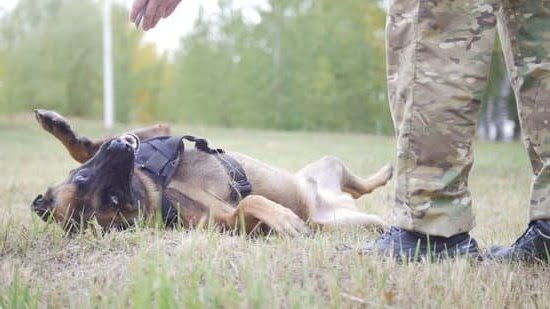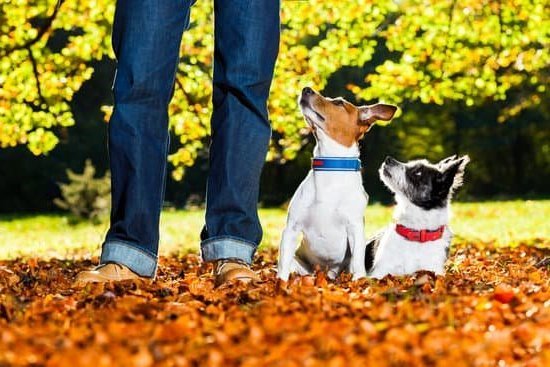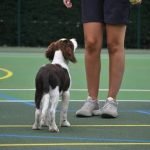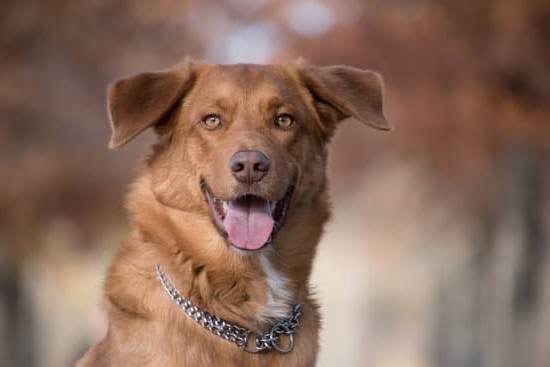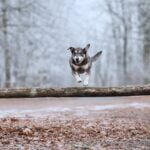Introduction
If you have a trained dog that has started peeing in the house, it can be incredibly frustrating. You may want to know why your pet has suddenly decided that the house is the best place for them to relieve themselves.
It could be caused by a number of things, so it is important to consider all potential causes before attempting to resolve the issue. Here are some common reasons behind why a trained dog might start peeing in the house and what you should avoid:
1) Increased Anxiety: A sudden increase in anxiety could cause your pup to revert back to pottying inside, because it allows them to be comforted by familiar smells and surfaces. This can stem from an emotional trauma such as going through new home transitions or changes in schedules, separation anxiety or fear of unfamiliar people or animals entering the home.
2) Illness/ Poor Health : Urinary tract infections, bladder stones or other conditions that may cause pain while urinating can lead a pup to potty indoors regardless of their training level as they associate undesired sensations with outdoors relieving spots. Additionally, if a pup is not feeling well due to age they may forget they’re housetrained and go where they feel most comfortable—the spot where they’ve gone previously indoors when feeling ill.
3) Lack of Exercise : Exercise is critical for keeping our beloved pups healthy and happy both physically and mentally. A lack of exercise can lead a pup to become bored which then can manifest into behavioral issues such as indoor pottying. Going for regular walks and providing interactive toys for mental stimulation can help keep anxious behaviors at bay, including indoor pottying!
4) Avoid Punishments : It is important not to punish your pup after the fact when dealing with accidents inside; this will only further increase their anxiety and confusion about peeing habits—further reinforcing their desire for indoor relief spots over outside ones. Instead provide positive reinforcement when successful so encourage them potty outdoors when those moments arise.
Medical Causes of Urinary Incontinence and Treatments
Medical causes of urinary incontinence in trained dogs can include bladder infections, bladder inflammation from the crystals found in food or medication, urinary tract blockage from stones, prostate enlargement, and nerve damage. Additionally, certain medications may treat other conditions that cause a dog to lose control of urination.
Infections and Inflammations: Urinary tract infections are the most common cause of urine accidents. If your dog’s urine appears cloudy and smells intensely bad, then an infection is likely to blame as bacteria grow abnormally in the urinary tract or bladder wall. In some cases, inflammation of the bladder caused by bladder stones can also lead to involuntary urination. Treatment for such issues includes antibiotics to kill off the bacteria or supplements and dietary tweaks in order to dissolve stones over time.
Bladder Blockages: Bladder blockages caused by things like stones and tumors cause difficulty with urination and usually result in increased dribbling at home when straining occurs. Surgery may be necessary to remove any foreign objects obstructing the flow of urine if x-rays confirm its presence.
Prostate Enlargement: An enlarged prostate can interfere with regular urination, resulting in accidents indoors due to a weakened urinary tract muscle tone. This issue is more common among older dogs but early diagnosis can minimize treatment time drastically. Treatment involves both medication for pain relief as well as medication designed to shrink prostate tissue slowly back into proper form.
Nerve Damage: Nerve damage from diabetes, kidney disease, auto-immune disorders like Addison’s Disease or Cushing’s Disease may cause frequent urination during the day or night which can lead to messes in the house due to your pup not being able respond fast enough when given commands or access outside quickly enough during walks and potty breaks alike. Treatment here depends on accurately diagnosing underlying medical conditions though pain management may help too if feasible long term solutions cannot be determined at once.
Fear, Anxiety and Your Dog
The main reason why a trained dog may occasionally pee in the house is due to a combination of fear and/or anxiety. Dogs are naturally fearful and anxious creatures, and these emotions can cause them to behave in ways that are inconsistent with how they were trained. This has the potential to result in accidents and urine marking, especially if your pet isn’t comfortable or relaxed in their environment.
In certain situations, dogs may also act out due to frustration or discomfort because of restrictions placed on them. If a pet isn’t getting enough exercise or mental stimulation, this can lead to higher levels of anxiety which could cause them to behave in ways such as peeing inside your home. Additionally, a heightened sense of fear can often be provoked by something as simple as loud noises from the street outside or simply unfamiliar people coming into your house.
It’s important to pay attention to all possible triggers that might set off unwanted behaviors for your pet so you can properly address them before incidents like peeing inside occur again. This will typically involve showing patience towards your furry friend while steadily helping them feel more at ease within their space by offering positive reinforcement.
Stress Induced Urination
Trained dogs may start to urinate in the house for a variety of reasons. Stress induced urination is one of the most common causes, and often occurs when dogs are anxious or scared because of changes in their environment. Dogs may also display stress-induced behaviors if they have experienced trauma, abuse, or neglect before being adopted or rescued. Fortunately, there are steps owners can take to help prevent and treat stress-induced urination.
The first step to helping alleviate stress-induced urination is ensuring that your dog feels secure and relaxed in its environment. This should include providing comfortable sleeping areas away from noise and activity, as well as bonding with your dog through positive reinforcement training during playtime and training sessions. Additionally, it can help to create an uninterrupted routine by engaging them in regular walks and playtimes that encourage both mental and physical stimulation.
If stress is suspected as the cause for the urinary accidents, owners should also consider visiting their vet for a full medical evaluation. A medical exam can rule out any health conditions causing increased anxiety such as hormonal imbalances or bladder infections. If a medical condition is found as the cause of the behavior, then medical treatment should be pursued along with follow up visits from both owner and vet alike.
Finally, medication may be recommended depending on the severity of the issue. If considered appropriate by a vet, anxiety medications or medications specifically formulated for reducing reactivity or fearfulness can be used to help bring symptoms under control during times when they cannot be managed through behavioral modification alone.
Submissive or Excitement Urination
Trained dogs can sometimes urinate in the house, usually due to submissive or excitement urination. Submissive urination is common among puppies and adolescent dogs, who often display submissive behaviors when they are nervous or excited. This type of urination typically occurs during greetings or when someone is touching or handling the dog, and is often accompanied by low tail-wagging and cowering guidelines. Excitement urination may also occur in some adult dogs when they become overly excited about an event or situation, such as when guests come over.
To help manage these types of accidental indoor accidents, it’s best to make sure the dog knows that such behaviors are not okay. It’s important to remain calm and avoid scolding or punishing the dog for any accidents – instead, provide them with consistent feedback until they understand what is expected of them. Additionally, it can help to reward your pup for appropriate behavior (such as sitting calmly) with treats or a positive verbal affirmation. It can also be beneficial to gradually introduce situations that could trigger these behaviors one at a time – for example, teaching them a “go” command before visitors arrive will help your pup understand that excited behavior is not an option inside the home. Finally, if your pup does have an accident in the house, it’s important to thoroughly clean the soiled area with an enzymatic cleaner (formulated specifically for pet messes) so that he won’t continue going in that spot.
Separation Anxiety
Trained dogs peeing in the house can be a sign of separation anxiety, which is when a dog experiences fear and anxiety due to the fact that their owner has been away for an extended period of time. Separation anxiety can manifest itself in different ways, such as excessive barking, pacing, panting, destructive behavior or relieving themselves indoors. With separation anxiety, a pet may feel panicked when they think their owner is going to leave them alone. This can lead to terrified behavior that is difficult for owners to cope with their pets exhibiting signs of distress.
To help treat separation anxiety or prevent it from developing in the first place, it’s important for owners to provide daily mental and physical stimulation for their pup – this could include anything from interactive games like hide-and-seek or fetch, Kong toys stuffed with treats or even taking them on more walks. Additionally, owners should ensure their pup has lots of positive reinforcement during training sessions and make sure they are receiving quality nutrition that suits their individual needs. It’s also important to note that if the dog leaves messes in the house due to separation anxiety these messes should never be punsihed as punishment will only further increase the pups stress levels and likely worsen any behavioral issues being exhibited. Finally, providing your pup with additional items associated with comfort like beds, blankets and toys may help combat any anxious feelings your pup feels when home alone.
Housebreaking
There are many reasons why a trained dog may pee in the house, even after being housebroken. One of the primary culprits is stress. Most dogs have an instinctual need to mark their territory with urine, and this instinct can get magnified when they are experiencing stress. Medical issues such as diabetes or a urinary tract infection could also be a cause of accidents. Finally, changes in schedules and environments can lead to confusion in your pup and cause them to have difficulty following rules that were once well-ingrained practices.
To ensure your trained pup does not end up developing an on-again/off-again housebreaking issue, try these “forget-me-not” tips:
1. Keep your pet routines consistent – You should aim for quick bathroom trips outside with regularity throughout the day and at specific times. Don’t forget to repeat verbal commands for elimination (such as “go potty”) each time you take them out – this helps create positive reinforcement for outdoor bathroom breaks!
2. Provide exercise and stimulation – Mental activity paired with physical activity will help train your pup to stay better focused and help reduce stress levels – leading to less chances of indoor peeing incidents.
3. Clean up accidents immediately – And make sure they don’t fall into bad habits by cleaning any residual odor from previous mistakes; enzymatic cleaners are especially helpful for leaving behind no traces of scent, which encourages further marking indoors.
4. Reinforce positive behavior – If an accident does occur indoors but you manage to catch it right away (or just afterwards), quickly correct the pup and bring them outside again immediately – THEN reward their good behavior when they do go outside!
Territorial Instincts
A trained dog may start to pee in the house due to territorial instincts. Dogs, like many other animals, compete for the territory they live and bring up their young. If a new person or pet is introduced into their space, the dog may feel the need to mark their territory by urinating in it. This can be even more of an issue if there are other dogs nearby as well.
In order to prevent this behavior from occurring, it is best to introduce any new people or animals slowly and establish clear boundaries. Give your dog access to its own space without any intrusions from others and avoid making it feel uncomfortable or crowded. It is important not to show them punishment for their territorial instinct as this will only make things worse in the long run. Instead, focus on positive reinforcement when they exhibit good behavior and be sure meals, treats and playtime are regular parts of their routine.
If territorial compulsion does become an issue after taking these steps, you can take additional measures such as having your dog desensitized with a professional trainer or look into barking or calming collars/wearable devices designed specifically for this type of instinctual behavior. Ultimately, understanding that a trained dog peeing in the house because of territorial instincts is part of their nature but also maintainable with consistent approaches that bolster positive reinforcement will guarantee success both inside and outside the home.
Conclusion
One of the most important steps in getting your dog to stop peeing in the house is to identify and address any underlying medical issues. It is possible that your dog has a bladder infection, a urinary tract infection, bladder stones, or diabetes, which can cause them to have problems with urinating indoors. If you suspect that your dog has a medical issue causing them to urinate inside, it is important to take them to the vet for testing and treatment.
The next step is to ensure that your pet is getting enough exercise and mental stimulation — a lack of these can lead to undesired behaviors such as urinating indoors. You should consider taking walks with your pup everyday and providing them with interactive toys or playtime activities. Additionally, you should establish a regular potty-training routine for your dog so that they know when and where it is acceptable for them to go potty.
Finally, if you’ve addressed any potential medical issues and are sure there are none, then you may need to look at behavior modification techniques such as reward-based training methods (positive reinforcement). Make sure that every time they use their designated spot indoors or outdoors they get an immediate reward so they start associating going potty with good things! With consistency and patience, you can help discourage your pup from urinating indoors permanently!

Welcome to the blog! I am a professional dog trainer and have been working with dogs for many years. In this blog, I will be discussing various topics related to dog training, including tips, tricks, and advice. I hope you find this information helpful and informative. Thanks for reading!

